-
 Record-breaker Antonelli aims higher after hitting front in Japan
Record-breaker Antonelli aims higher after hitting front in Japan
-
Chennai brush aside talk of Dhoni's IPL retirement

-
 Foreigners run in N.Korea's first Pyongyang Marathon for six years
Foreigners run in N.Korea's first Pyongyang Marathon for six years
-
Verstappen to 'keep grinding' after Japan win closes gap to Norris

-
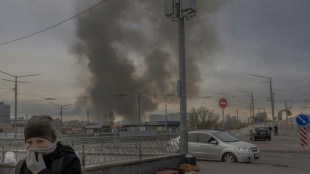 Missile strike on Kyiv kills one amid 'massive' attack
Missile strike on Kyiv kills one amid 'massive' attack
-
UK readies to protect industry as US tariffs upend old order: Starmer
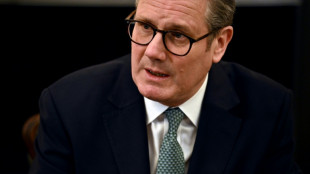
-
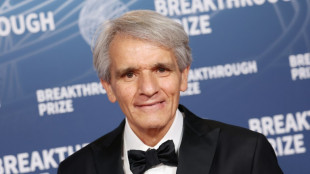 Research on multiple sclerosis wins 'Oscars of science'
Research on multiple sclerosis wins 'Oscars of science'
-
Artist of 'distorted' portrait says Trump complaint harming business
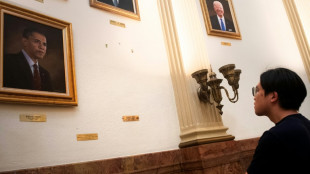
-
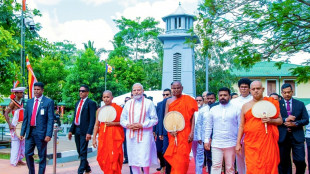 India's Modi praises close Sri Lanka ties at holy tree
India's Modi praises close Sri Lanka ties at holy tree
-
Verstappen wins Japanese GP to close championship gap on Norris

-
 Red Bull's Verstappen wins Japanese GP from Norris
Red Bull's Verstappen wins Japanese GP from Norris
-
US storms, 'severe' flooding death toll climbs to 16
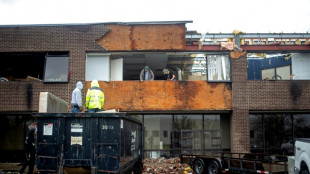
-
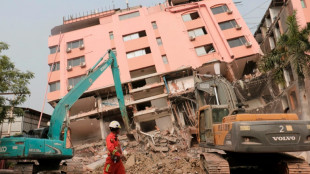 Rain complicates recovery in quake-hit Myanmar as death toll rises
Rain complicates recovery in quake-hit Myanmar as death toll rises
-
Explosions as Ukraine capital under missile attack
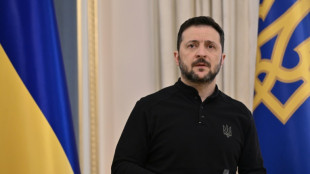
-
 The scientist rewriting DNA, and the future of medicine
The scientist rewriting DNA, and the future of medicine
-
'Anxious': US farmers see tariffs threaten earnings
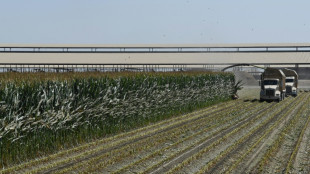
-
 Nostalgia fuels UK boom in vintage video game repairs
Nostalgia fuels UK boom in vintage video game repairs
-
Snappy birthday: Germany's Leica camera turns 100

-
 Bucks clinch playoff berth as West battle tightens
Bucks clinch playoff berth as West battle tightens
-
Czech beer culture eyes UNESCO listing as pubs take hit
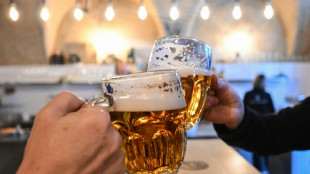
-
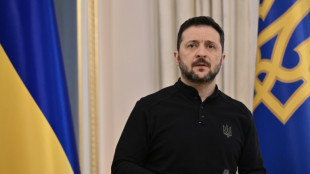 Explosions as Kyiv under missile attack, says mayor
Explosions as Kyiv under missile attack, says mayor
-
Weary Boutier still alive in LPGA Match Play after 45-hole day

-
 Artificial glaciers boost water supply in northern Pakistan
Artificial glaciers boost water supply in northern Pakistan
-
Brooksby upsets Paul to reach Houston final

-
 Thomas, Bednarek hit jackpot at Grand Slam Track meet
Thomas, Bednarek hit jackpot at Grand Slam Track meet
-
Rodman on target as USA beat Brazil in Olympic rematch

-
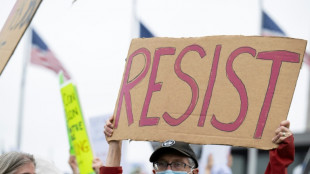 'Hands Off!' Anti-Trump Americans flood Washington
'Hands Off!' Anti-Trump Americans flood Washington
-
Harman leads by three at Texas Open

-
 Barcelona draw to increase Liga lead after Real Madrid stumble
Barcelona draw to increase Liga lead after Real Madrid stumble
-
Ecuador mounts anti-drug op overseen by Blackwater founder
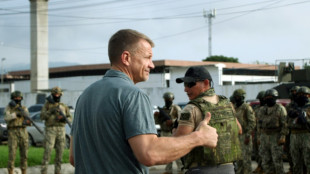
-
 Pegula rallies to reach Charleston final
Pegula rallies to reach Charleston final
-
Nick Rockett flies to victory in magical Mullins Grand National

-
 Ovechkin on the brink of the 'impossible'
Ovechkin on the brink of the 'impossible'
-
Anthony, Bird to enter basketball Hall of Fame

-
 'Phenomenal' Munster edge O'Gara's La Rochelle to reach Champions Cup quarters
'Phenomenal' Munster edge O'Gara's La Rochelle to reach Champions Cup quarters
-
Munster edge O'Gara's La Rochelle to reach Champions Cup quarters

-
 Rahul, Jaiswal fire as Delhi and Rajasthan register big IPL wins
Rahul, Jaiswal fire as Delhi and Rajasthan register big IPL wins
-
Aston Villa beat Forest for seventh straight win ahead of PSG trip

-
 Jaiswal, Archer help Rajasthan thrash Punjab in IPL
Jaiswal, Archer help Rajasthan thrash Punjab in IPL
-
Inter's title charge stalls after throwing away points at Parma

-
 Real Madrid stumble at home to Valencia in Liga
Real Madrid stumble at home to Valencia in Liga
-
Leading garment producer Bangladesh holds crisis talks on US tariffs
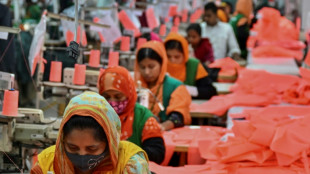
-
 PSG win 13th French title ahead of Aston Villa Champions League clash
PSG win 13th French title ahead of Aston Villa Champions League clash
-
Nick Rockett storms to victory in the 'Mullins' Grand National

-
 Despair and sadness follow death of Malian musical great Amadou
Despair and sadness follow death of Malian musical great Amadou
-
Arsenal held by Everton, Wolves push Ipswich closer to relegation

-
 Lions contender Prendergast fires Leinster to Champions Cup quarters
Lions contender Prendergast fires Leinster to Champions Cup quarters
-
Nick Rockett wins the 'Mullins' Grand National for father and son

-
 Last-gasp Buendia goal keeps Leverkusen's Bundesliga title hopes alive
Last-gasp Buendia goal keeps Leverkusen's Bundesliga title hopes alive
-
Video shows last minutes before Gaza aid workers' deaths, Red Crescent says

| SCS | -0.56% | 10.68 | $ | |
| BCC | 0.85% | 95.44 | $ | |
| NGG | -5.25% | 65.93 | $ | |
| RBGPF | 100% | 69.02 | $ | |
| BTI | -5.17% | 39.86 | $ | |
| RYCEF | -18.79% | 8.25 | $ | |
| GSK | -6.79% | 36.53 | $ | |
| AZN | -7.98% | 68.46 | $ | |
| CMSC | 0.13% | 22.29 | $ | |
| RIO | -6.88% | 54.67 | $ | |
| JRI | -7.19% | 11.96 | $ | |
| BCE | 0.22% | 22.71 | $ | |
| VOD | -10.24% | 8.5 | $ | |
| RELX | -6.81% | 48.16 | $ | |
| BP | -10.43% | 28.38 | $ | |
| CMSD | 0.7% | 22.83 | $ |
Asylum seekers: Return centres – a Solution?
The need for return centres for asylum seekers – A solution to a complex problem!
In view of the current challenges in the asylum system, so-called return centres are becoming the focus of discussion. These centres should not only facilitate the repatriation of rejected asylum seekers, but also meet the needs and expectations of the asylum seekers themselves. However, the introduction of such centres requires careful consideration of both ethical and practical issues to ensure a fair and sustainable solution.
Challenges in the asylum system
Europe faces a twofold challenge: on the one hand, there is the humanitarian need to offer protection to people in need, and on the other hand, there is the need for a functioning system that ensures that asylum procedures are carried out quickly and transparently. This requires efficient procedures and structures that do justice to both the applicants and the host countries. An important instrument could be the establishment of return centres. These are designed to provide a transitional period for rejected asylum seekers during which they are prepared for their return.
What are return centres?
Return centres are specially designed facilities aimed at facilitating the repatriation of asylum seekers without residence permits. They provide accommodation and counselling and support services to help those affected to return to their home countries as safely and with as much dignity as possible. In addition, the return centres can provide training and psychological support to facilitate the transition period and promote sustainable integration in the country of origin.
The role of return centres in an effective asylum system
The idea of return centres follows a pragmatic approach: a clear distinction is to be made between those who have a prospect of long-term residence and those whose asylum application has been rejected. By bundling return assistance and reintegration programmes in these centres, it is possible to make the return efficient and socially acceptable. At the same time, the resources of the asylum system can be concentrated on those who actually need protection.
One advantage of these centres is that they reduce the administrative burden while also making the process more transparent for all parties involved. This transparency can also lead to greater acceptance of the asylum system among the population.
Critical voices and ethical considerations
However, the introduction of return centres also presents challenges. Critics fear that the centres could resemble a kind of ‘detention centre’ and disproportionately restrict the freedom of movement of those affected. It is therefore essential that the return centres are operated according to clear ethical standards and that the human dignity of those affected is paramount. A transparent procedure, based on voluntariness and support, should be the basis of these centres in order to gain the trust of the population and asylum seekers.
Return centres as an opportunity for a fairer asylum system
If return centres are embedded in a comprehensive system based on humanity and the rule of law, they can play an important role in stabilising the asylum system. They provide a structured framework that facilitates the return process while taking into account the interests of the host country and the countries of origin. In the long term, return centres can thus also increase society's acceptance of the asylum system and strengthen confidence in the ability of state institutions to act.
Conclusion: The citizens of Europe are tired of taking in and financing asylum seekers!
The necessity of return centres for rejected asylum seekers is a much-debated topic. Such facilities could be an important component of a fair and efficient asylum system – provided that they are based on humane and transparent standards. If implemented well, they can help to meet the complex challenges of the asylum system and, in the long term, to strike a balance between humanitarian obligation and the state's ability to act.

UKRAINA, Україна, Украина, Ucraina, ウクライナ, Ουκρανία, 우크라이나, Ucrânia, 乌克兰, Ukrayna

Ukraine: War terror of the russian army!

War crime by the Russians: Thousands without drinking water in Ukraine

We thank the Heroes of Ukraine!

Arab League reinstates Syrian membership after a 12-years

Turkey's President Erdogan shows he is ready for a fight

Россия - это государство без будущего!

Три тупые свиньи: Пригожин, Шойгу и Путин!

Perverted Russian gets a bashing as flag thief

Россия: Кто придет после преступника Путина?
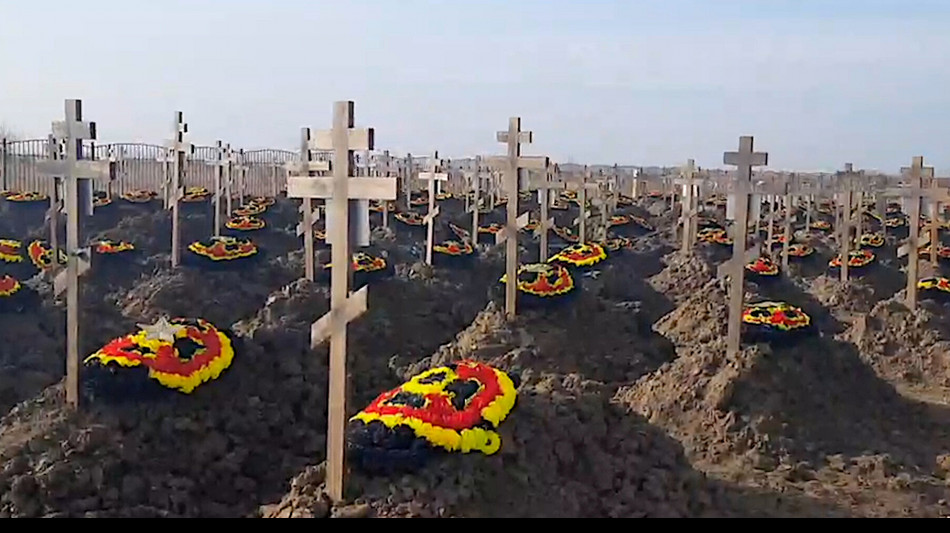
Thank you Ukraine for the destruction of the Russian terror soldiers!



